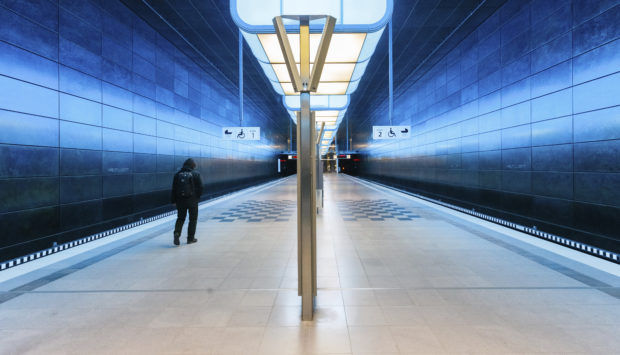German leader calls coronavirus biggest challenge since WWII
BERLIN — Germany has not faced a challenge like the new coronavirus outbreak since World War II and every person in the country must help protect those most vulnerable to illness, Chancellor Angela Merkel said Wednesday night in her first direct televised address to the nation other than her annual New Year’s speech.

A single man walks on a platform of the subway station Hafencity University in Hamburg, Germany, March 18, 2020. Due to the measures taken to combat the corona virus, the number of passengers on local trains has dropped considerably. For most people, the new coronavirus causes only mild or moderate symptoms, such as fever and cough. For some, especially older adults and people with existing health problems, it can cause more severe illness, including pneumonia.(Markus Scholz/dpa via AP)
Merkel, a physicist by training, who has led Germany for over 14 years, said that while researchers are racing to develop a vaccine to prevent infections and medications to treat COID-19, slowing the spread of the virus is currently the only way to minimize the number of people who get sick.
“Let me tell you: This is serious. Take it seriously ,too,” Merkel said in a speech aired by several public and private TV stations.
“Germany has an excellent health system, perhaps one of the best in the world,” she said. “But our hospitals, too, would be completely overwhelmed if too many patients would be delivered in too short a time.”
Germany had 11,973 confirmed virus cases as of Wednesday evening, the fifth-highest number in the world, according to a tally by Johns Hopkins University. Among all the people with the virus in the country, 28 have died, the university’s tally said.
Those patients are not just abstract statistics but, “a father or a grandfather, a mother or a grandmother, a partner. They are human beings,” the chancellor said. “And we are a community in which every life, every human being, counts.”
Article continues after this advertisementWhile updating worldwide infections to more than 214,000 since the new virus emerged, Johns Hopkins University said more than 82,000 people have recovered.
Article continues after this advertisementCOVID-19 respiratory illness causes only mild or moderate symptoms such as fever and cough in most people, with severe cases more likely in the elderly and those with existing health problems.
Earlier Wednesday, the German government said it had arranged in coordination with state officials to increase hospital capacities, especially for patients requiring intensive care. The government also directed hospitals to check if discarded beds and medical devices could be put back into service, saying experts were predicting the number of cases to rise quickly in coming weeks.
In her speech, Merkel called on everyone in the country of 83 million to stay home and to practice social distancing when they must go out despite the natural instinct to want to come together during times of worry.
“I appeal to you: Please obey the rules, which will now be valid for the coming times,” Merkel said. “We as a government will constantly check what needs to be corrected but also, what perhaps still needs to be done.”
Germany’s Interior Ministry said Wednesday night that restrictions on entering the country were being immediately expanded to include checks of passengers flying in from Italy, Austria, Spain, France, Luxembourg, Denmark and Switzerland.
Cross-border commuters will need to carry forms documenting their need to travel for work, and others should avoid coming to Germany, the Interior Ministry said.
The German government previously closed schools, universities, clubs and movie theaters but has refrained from strictly limiting the population’s movements and locking down the entire country like Italy, Spain and France have in response to the worldwide pandemic.
GSG
For more news about the novel coronavirus click here.
What you need to know about Coronavirus.
For more information on COVID-19, call the DOH Hotline: (02) 86517800 local 1149/1150.
The Inquirer Foundation supports our healthcare frontliners and is still accepting cash donations to be deposited at Banco de Oro (BDO) current account #007960018860 or donate through PayMaya using this link.